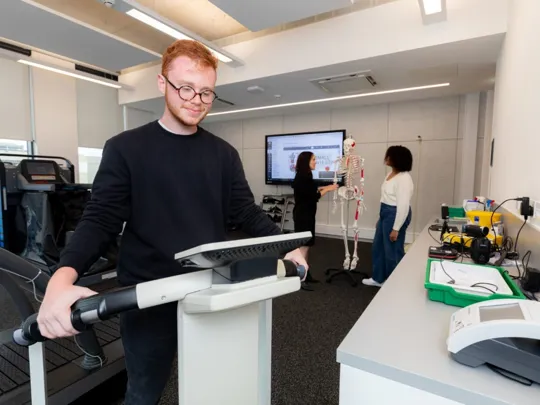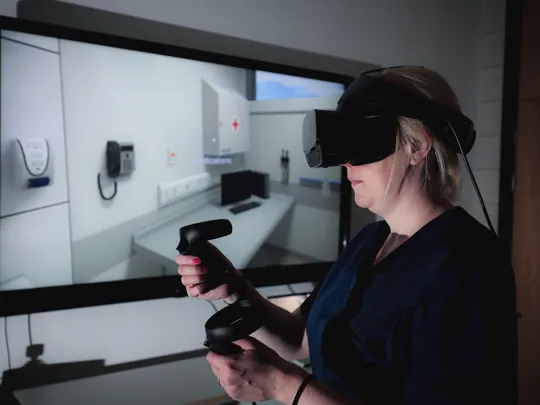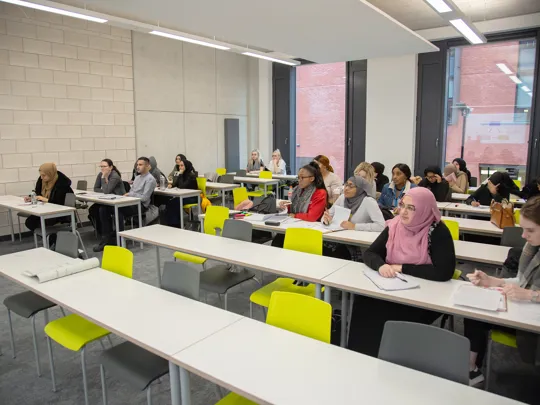of graduate employers say relevant experience is essential to getting a job with them
Why should I choose this course?
- PROFESSIONAL BODY STANDARDS – This course has been written to the standards set by the professional body for psychology and accreditation will be applied for before the course starts in September 2024
- INDUSTRY-FOCUSED MODULES – You will be exposed to modules shaped to develop the skills valued by employers, with applied practice to give you real understanding of using psychology in industry environments. You will get to conduct research you are passionate about, develop your interpersonal skills through client interaction and benefit from authentic assessments
- EXPERT TUITION – Learn from our highly-qualified teaching staff, who have extensive knowledge and experience in the field of psychology, including forensic, sport and exercise psychology
Our facilities
As a psychology student, you will have access to our state-of-the-art psychology lab. Here you can develop your research skills and put some of your theoretical learning to the test, measuring psychophysiological responses to stimulus with our range of specialist equipment. As psychologists rarely work in isolation, this will be embedded in your course, so you will gain valuable knowledge and experience in multidisciplinary teams and environments across the university. This may include shadowing disciplines such as sport and nutrition, health and social care, nursing and physiotherapy to gain a holistic understanding of the role of psychology in different populations and with different stakeholders.
Course breakdown
- Modules
Brain, Mind and Behaviour
This module blends the two core areas of cognitive psychology and biological psychology to help you gain a comprehensive understanding of the brain, mind and behaviour. You will focus on the scientific concept of metacognition and the act of thinking about thinking, critically exploring topics such as memory, attention, problem solving, language and decision-making. You will learn about the function and structure of the brain and critically explore some of the mysteries that influence the way we think, feel, and behave. You will also critically evaluate the role of genetics and the environment and how the two operate to affect behaviour. Have you ever wondered why we sometimes get a physical response to psychological problems? Well, neuroscience may hold some answers for you and this module will help you understand through the scientific study of the nervous system. The relationship between the brain and our behaviour is complex and you will empirically test some of these links by undertaking practical sessions with specialist equipment in our psychology lab. These small group sessions will help you contextualise your theoretical learning from lectures, and you will be able to develop your understanding of how much ‘nature’ has to do with how we think, feel and behave.
Personality and Individual Differences
Our Individual Differences and Personality module critically explores the diverse ways in which individuals vary in their thoughts, feelings and behaviours. You will consider the contextual and historical psychological approaches and bring debates up to date with contemporary application to the modern world. Celebrating the uniqueness of people will be central to your work in this module as you critically explore the intricacies of human nature and how and why individual’s psychological traits differ. One exciting aspect of this module is the constant self-discovery the learning offers, where, as you critically evaluate different personality theories and approaches, you will gain valuable insights into your own traits, tendencies and quirks that make you unique. This will enhance your critical reflection and awareness of the diversity of humans, with topics around gender, intelligence and attitudes sparking life into the content, and encourage you to delve into the differences in peoples’ cognitive make-up and the role of areas such as emotion, motivation and mood. Once you have grasped the fundamental theory, this module will continue to apply it to the world around us and you will critically explore the use of psychometrics to make sense of the challenges around this, both practically and morally, across a range of contexts. You will apply your knowledge to real-life situations, where you will develop skills such as communication, empathy, and conflict resolution by engaging in meaningful debates and discussions with your fellow peers to appreciate the beauty of human diversity.
MSc Quantitative Research Methods
Research is a core component across psychology, with this module essential to strengthening your understanding of the importance of scientific research across all related topics and critically exploring how research helped us move things forward to challenge some of the conceptual and historical issues in psychology. This module guides you through a numerical approach to working with data and you will develop skills to critically explore the importance of identifying and evaluating patterns in behaviour, psychological functioning and experience. You will generate and explore hypotheses and research questions, drawing on relevant theory and research. To consolidate your theoretical understanding, you will spend time in the psychology lab, both designing and conducting empirical studies involving a variety of data collection methods, including experiments, observation and questionnaires. You will get some hands-on experience using specialist software, laboratory equipment and psychometric instruments so that you can apply psychological knowledge ethically and safely to real-world problems.
MSc Qualitative Research Methods
This module critically explores qualitative approaches to undertaking psychological research and you will learn through a variety of lectures, workshops, practical tasks and computer-based sessions. Here, you will develop a rich appreciation of research questions that may be best answered by taking a qualitative approach, and from there, critically evaluate the different methodological options to answering such questions. Qualitative research is becoming increasingly appreciated in psychology, as it really helps us answer the why? questions. It allows us to gather a wealth of data in diverse ways, which rather than numbers, is usually words. It may even be images or rigorous interpretation of multimedia sources. Different approaches to understanding research from a qualitative perspective will be introduced to you and you will get the opportunity in class for critical debate and practical-based work, where you not only devise project ideas, but will collect qualitative data using a choice of methods. Here you can try out your skills of interviewing and conducting focus groups and use the data you collect to make sense of a complex problem. You will then analyse data using a specialist software package in our computer lab and interpret it in line with your chosen approach.
Social and Community Psychology
This module critically explores a range of external factors at play which can help explain behaviour and introduces you to social cognition, and the factors around us that can affect us and how we attribute meaning and value to things. By studying this module, you will critically explore the role of psychology across diverse cultural, ethnic and social communities. Here, you will study contemporary topics within social psychology such as cultural influences on mental health, the impact of marginalisation, the dynamics of intergroup relations, societal attitudes and bias, and social influence. Within this, you will be able to focus on the application of human behaviour, cognition and emotion and how these may differ across populations and the unique challenges presented by these. These topics play a big part in how society operates, where you will be able to equip yourself with the knowledge and awareness of working across diverse communities and populations with genuine empathy.
Lifespan Psychology
This module introduces you to key developmental psychology approaches to understanding people from birth through to older adults, with a wide range of developmental stages inbetween. Much of the traditional developmental literature focuses on babies and children, yet this module will use those approaches to bring our understanding right up to date and critically apply contemporary research to development at all stages of the lifespan. You will critically explore typical development and what that may look like, but psychologists are often concerned more with atypical development as a better understanding of this can help inform how we work with and support people whose development may have caused problems for them and others. This module will critically evaluate key learning and core psychology covered in other modules you have completed so far, and you will explore attachments that we form to others, emotional development and theory of mind.
MSc Psychology Dissertation (60 credits)
This 60-credit module allows you to showcase your research knowledge and skills developed over the course so far. Here you will select a topic of interest which is worthy of further study, and you will design a research project to help you answer a specific question. Through critically applying your skills in literature searching, synthesis of findings and appreciation of selecting the best methodology, you will devise your research plan and then carry out this research. You will then critically report on the findings, robustly interpreting them through analysing and making logical recommendations for future work. This dissertation is something we will support you to be ready for over your course, and you will be allocated an academic supervisor who will be there to help you. This research project can be related to any area of psychology you choose, so it allows for you changing interests over the course. After all, we will be opening your minds to question different approaches and to inform you about areas of psychological work you never knew existed. Over your previous modules of study, you will have been exploring ethical guidelines, frameworks and practice and across your research, you will be demonstrating your application of these by making ethical decisions about the route you take and ensuring participant safety. You will also have studied modules in both quantitative and qualitative research methods and so the choice is yours as to which approach you take. You may even combine the two and take a mixed methods approach to answering your question. This project will help you bring together your skills of problem solving, critical thinking, analysis and communication, ready for the next stage in your studies or career journey.
The modules listed above for this course are regularly reviewed to ensure they are up to date and informed by industry as well as the latest teaching methods. On occasion, we may need to make unexpected changes to modules – if this occurs, we will contact all offer holders as soon as possible.
Entry requirements
Academic
- Applicants must have an honours degree (2:2 or above) in a non-psychology subject
- Applicants will be required to attend an interview for this course
- Applications from candidates with relevant experience will be considered on an individual basis. Each application will be considered on its merits and the final decision will be made by the programme leader
- English and maths GCSEs at grade C/grade 4 or above (or equivalent). Non-standard entry applicants will be considered on their merits. Evidence of qualification must be submitted
- Applicants must supply a full transcript and two academic references at the point of application
International students
- Applicants must have an honours degree (2:2 or above) in a non-psychology subject
- Applications from candidates with relevant experience will be considered on an individual basis. Each application will be considered on its merits and the final decision will be made by programme leader
- IELTS or equivalent*: 7.0 overall, with no component lower than 6.5
- English and maths GCSEs at grade C/grade 4 or above (or equivalent). Non-standard entry applicants will be considered on their merits. Evidence of qualification is also required
- Applicants must supply a full transcript and two academic references at the point of application
- In addition, students who have resided outside the UK will be required to provide evidence of a satisfactory overseas police check. Instructions on how to complete these checks will be provided once you hold a firm offer for this course
For academic and English entry requirements for EU and international students, please visit the Country Specific Information page.
Please note: As an International Student, when choosing optional placement, a visa extension may be required.
Disclosure and Barring Service (DBS)
Students on this course are subject to the BPS Code of Professional Conduct and University Fitness to Practise Policy, together with a Disclosure and Barring Service (DBS) check. University College Birmingham will co-ordinate and fund the completion of the DBS check.
Additional
All applicants will be interviewed.
The programme is designed to meet all the necessary requirements of the professional body standards so that students are eligible to progress to the next stage of study/training should they wish to pursue a registered route.
Key information
Teaching and assessment
Students will experience various teaching methods and settings including:
- Lectures
- Workshops
- Tutorials
- Individual and group presentations
- Virtual Learning Environment (VLE) - electronic resources to facilitate face-to-face learning
- Weekly Graduate Advantage sessions
Small seminar groups will allow you to apply lecture material and build confidence in designing your own projects with support from your lecturers and technician. You will make use of our specialist software packages and equipment to help make sense of complex societal problems.
A range of authentic assessment methods are available to students, which reflect workplace scenarios, including evaluation and critical analysis. Central to these will be the student’s ability to engage in reflective practice. There will also be a dissertation component, where students are able to carry out a project of their choosing.
Our teaching and assessment is underpinned by our Teaching, Learning and Assessment Strategy 2021-2024.
Tuition fees
UK students
If you are a UK student or an EU student with settled or pre-settled status enrolling on an MA/MSc course at University College Birmingham, your fee for the academic year 2024/25 will be £9,350. The fee for the PGDip course is £6,350.
View postgraduate fees
International students
If you are an international student enrolling on one of our postgraduate programmes (e.g. MSc, MA) in 2024/25, your fee for this academic year will be £15,000 per year.
Unibuddy Community - meet other students on your course
Starting university is an exciting time, but we understand that it can sometimes feel a little daunting. To support you, you will be invited to join our Unibuddy Community, where you can meet other students who have applied for the same course at University College Birmingham, before you start studying here.
As soon as you have been made an offer, you will be sent an invitation email to complete your registration and join the Unibuddy Community. For more information, check out our Unibuddy Community page.
Work placements
While there is no compulsory work placement on this course, placements can be invaluable for gaining real-life experience and for building your confidence and skills before you finish your course – and they may even lead to a job when you graduate. Our Hired team can help find the ideal placement for you.
Work alongside experts in your sector
A snapshot of some of the employers we have worked with:
- Active Wellbeing Society
- Birmingham Women's and Children's NHS Foundation Trust
- Sandwell and West Birmingham NHS Trust
- Birmingham and Solihull Mental Health Foundation Trust
- Birmingham Community Healthcare NHS Foundation Trust
- Birmingham and Solihull NHS Training Hub
- The Royal Orthopaedic Hospital NHS Foundation Trust
- Healthcare at Home Ltd

"As a practitioner psychologist, I find it fascinating trying to understand why we think, feel and behave the way we do. Studying psychology is amazing as it exposes you to a range of disciplines where you learn to understand how the mind develops as you age, across different environments and with different people. If you love working with people and helping drive behaviour change, improving wellbeing or enhancing performance, our MSc degree will help you achieve this."
Career opportunities
The example roles and salaries below are intended as a guide only.
Psychotherapist
Average Salary: £49,000
Counsellor
Average Salary: £31,000
Clinical psychologist
Average Salary: £51,000
Further education teacher
Average Salary: £33,000
Social worker
Average Salary: £48,000
Forensic psychologist
Average Salary: £46,000

First for postgraduate support and resources
University College Birmingham was ranked first out of 101 higher education institutions for postgraduate student support and resources in the Postgraduate Taught Experience Survey (PTES) 2023.







